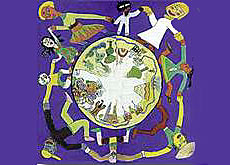Children have nothing to celebrate

The United Nations Convention on the Rights of the Child is 13 years old, but millions of youngsters around the world and in Switzerland still suffer abuse.
November 20, Universal Children’s Day, is intended to remind the world of the need to apply the Convention.
In 1989, the UN General Assembly approved the Convention. Its aims are to protect children against persecution, abuse and exploitation.
Terre des Hommes, the Swiss-based charity, says children’s rights around the world have improved since then, giving them better access to education and health care.
But the picture is far from perfect, and other problems have got worse with time, adds the charity.
“Heightened economic migration has led to increased trafficking of children,” said Bernard Boéton of Terre des Hommes.
”All countries are experiencing this phenomenon, not just poor nations, and Switzerland is among them.”
Because the world is becoming more urbanised, delinquency is also on the rise, and the authorities’ treatment of children is often sub-standard, according to the charity.
Terre des Hommes also points out that trafficking and exploitation of children is a global problem.
“Developing countries are no longer the only flashpoint for this issue, and the problem arises in every nation,” Boéton told swissinfo.
The Convention has so far failed to become a standard for the protection of children, but this doesn’t mean it has failed to fulfil its purpose.
Common language
“International conventions give us a common language,” said Boéton. “This is very important for our field work.”
Only two countries have failed to ratify the Convention so far: the United States and Somalia.
But its 54 articles are not necessarily applied by all those who signed the Convention, as each nation is free to adapt its laws.
Switzerland ratified the Convention in 1997, but despite this and the introduction of a new federal constitution, there is still much to be done, according to youth organisations.
“Policies in favour of children and teenagers are still lacking, starting with a proper maternity insurance,” said René Maytain of Pro Juventute.
The Swiss government has five objections to the Convention because they contradict national legislation, such as the country’s immigration laws.
Right to citizenship
The government has reservations concerning parental authority and will not accept the provision demanding the right to citizenship for any child born in Switzerland.
It also objects to family reunification, which would allow a foreign worker to bring his family into the country.
Switzerland also allows under-age delinquents to be jailed with adults, something the UN Convention explicitly forbids.
Switzerland also lacks a government department dealing with family matters, unlike many other countries. This role is assumed by private foundations, such as Pro Juventute.
Boéton says the result is that individual rights for children still have a long way to go in Switzerland.
Vigilant
“The fact that a country is rich or poor is of no consequence,” he said. “In a rich country like ours, there are other problems related to children’s rights, and we have to be just as vigilant.”
The Swiss Council for Youth Activities also believes there is not much to celebrate on November 20.
The association says children’s needs are way down the list of priorities for lawmakers.
It cites as examples the lack of protection against sexual abuse or the ban on education for the children of illegal immigrants.
For Swiss organisations working with children, Wednesday will be another opportunity to remind the world of the problems faced by children.
For Terre des Hommes, it’s a chance to hammer home the message that children’s rights needed to be protected even in the world’s most developed democracies.
swissinfo, Isabelle Eichenberger
The UN General Assembly accepted the Convention on the Rights of the Child on November 20, 1989.
It has been ratified by most of the world’s states, except for the United States and Somalia.
Switzerland ratified the Convention in 1997, but maintained some objections to the text.

In compliance with the JTI standards
More: SWI swissinfo.ch certified by the Journalism Trust Initiative


You can find an overview of ongoing debates with our journalists here . Please join us!
If you want to start a conversation about a topic raised in this article or want to report factual errors, email us at english@swissinfo.ch.